Muslim worshippers offer Eid al-Adha prayer at a park as mosques are limited for ten people following the government's measures to help stop the spread of the coronavirus, in the mixed Arab Jewish city of Jaffa, near Tel Aviv, Israel, Friday, July 31, 2020. This is the first Feast of Sacrifice since the onset of the global coronavirus pandemic. The major Muslim holiday, at the end of the hajj pilgrimage to Mecca, is observed around the world by believers and commemorates prophet Abraham's pledge to sacrifice his son as an act of obedience to God. (AP Photo/Oded Balilty)
The Associated Press
DUBAI, United Arab Emirates (AP) - Small groups of people performed one of the final rites of the Islamic hajj on Friday as Muslims worldwide marked the start of the Eid al-Adha holiday amid a global pandemic that has impacted nearly every aspect of this year's pilgrimage and celebrations.
The last days of the annual pilgrimage to Mecca in Saudi Arabia coincide with the four-day Eid al-Adha, or 'œFeast of Sacrifice,'ť in which Muslims slaughter livestock and distribute the meat to the poor.
The pandemic has pushed millions of people around the world closer to the brink of poverty, making it harder for many to fulfill the religious tradition of purchasing livestock.
In Somalia, the price of meat has slightly increased. Abdishakur Dahir, a civil servant in Mogadishu, said that for the first time he won't be able to afford goat for Eid because of the impact of the virus on work.
'œI could hardly buy food for my family," Dahir said. 'œWe are just surviving for now. Life is getting tougher by the day."
In some parts of West Africa, the price for a ram has doubled. Livestock sellers, used to doing brisk business in the days before the holiday, say sales have dwindled.
'œThe situation is really complicated by the coronavirus, it's a tough market,'ť Oumar Maiga, a livestock trader in Ivory Coast said. 'œWe are in a situation we've never seen in other years.'ť
The hajj pilgrimage has also been drastically impacted by the virus. Last year, some 2.5 million pilgrims took part, but this year it was limited to as few as 1,000 already residing in Saudi Arabia.
The Saudi Health Ministry said there have been no cases of the COVID-19 illness among this year's pilgrims. Government precautions included testing pilgrims for the virus, monitoring their movement with electronic wristbands and requiring them to quarantine before and after. Pilgrims were selected after applying through an online portal, and all had to be between 20 and 50 years of age.
Just after dawn Friday, small groups - masked and physically distancing - made their way toward the massive, multistory Jamarat Complex in the Saudi valley area of Mina. There the pilgrims cast pebbles at three large columns. It is here where Muslims believe the devil tried to talk the Prophet Ibrahim, or Abraham, out of submitting to God's will.
Muslims commemorate Ibrahim's test of faith by slaughtering livestock and animals and distributing the meat to the poor.
During the last days of hajj, male pilgrims shave their heads and remove the terrycloth white garments worn during the pilgrimage. Women cut off a small lock of hair in a sign of spiritual rebirth and renewal.
The hajj, both physically and spiritually demanding, intends to bring about greater humility and unity and is required of all Muslims to perform once in a lifetime.
Sheikh Abdullah al-Manea, member of the Supreme Council of Senior Scholars of Saudi Arabia, used the hajj sermon Friday to praise the kingdom for limiting the number of pilgrims and protect human life.
'œWe thank the positive role of Muslims around the world that have complied with the regulations of the country to protect them from the spread of this virus, which leads to the protection of Mecca and Medina," the sheikh said.
Around the world, Muslims gathered with relatives or remained at home to mark the start of Eid.
In Baghdad, streets were largely empty due to a 10-day coronavirus lockdown imposed by authorities. Eid prayers in mosques were canceled.
'œWe had hoped that the curfew would be lifted during the Eid period. ... We were surprised that the lockdown period included the Eid holiday and more,'ť cafe owner Marwan Madhat said. 'œThis will cause losses.'ť
Kosovo and the United Arab Emirates have also closed mosques to limit the spread of the virus.
In Lebanon, worshippers prayed in mosques under tight security, despite a partial lockdown imposed Thursday that will continue through Aug. 10. Worshippers at the Mohammad al-Amin Mosque in Beirut, spilled outside onto the street to maintain social distancing.
In Indonesia, home to the world's largest population of Muslims, people attended Eid prayers in mosques under strict guidelines, including that they bring their own prayer mats and pray several feet apart from one another. Worshippers had to wear masks and were not allowed to shake hands or hug.
Authorities also ordered that meat be delivered door-to-door to the poor to avoid long lines.
'œThis outbreak has not only changed our tradition entirely, but has also made more and more people fall into poverty,'ť said Agus Supriatna, an Indonesian factory worker laid off this year because of the pandemic.
In the United States, some attended prayers under similar distancing and safety rules, while others prayed at home.
At the Muslim Education Center in Morton Grove, Illinois, about 100 worshippers had their temperatures taken before entering and spacing themselves out on the floor. The imam's voice was slightly muffled as he preached through a mask about sacrifice and its relevance to the holiday.
And in Los Angeles, Arfa Faiz and a small group of friends were planning to take part in a socially distanced picnic at a park - a far cry from previous Eids when large groups would congregate on the beach or at a hall.
'œUsually in L.A. the Eid things are really big. They are very social, there's a lot of stuff going on,'ť Faiz said.
'œEid is a time to celebrate and be with the community,'ť she continued. 'œIt does feel a little sad.'ť
Ahead of the holiday, Alioune Ndong, a tailor in Mbour, Senegal, said he did not know how he'd afford an Eid feast and urged the government to help struggling families.
'œCOVID-19 has drained my money," Ndong said.
___
Associated Press writers Niniek Karmini in Jakarta, Indonesia; Fay Abuelgasim in Dubai, United Arab Emirates; Llazar Semini in Tirana, Albania; Abdi Guled in Nairobi, Kenya; Lekan Oyekanmi in Lagos, Nigeria; Abdoulie John in Mbour, Senegal; Hilaire Zon in Abidjan, Ivory Coast; Babacar Dione and Krista Larson in Dakar, Senegal; Ali Abdul-Hassan in Baghdad; Hassan Ammar in Beirut; Mariam Fam in Winter Park, Florida; and Noreen Nasir in Louisville, Kentucky, contributed to this report.
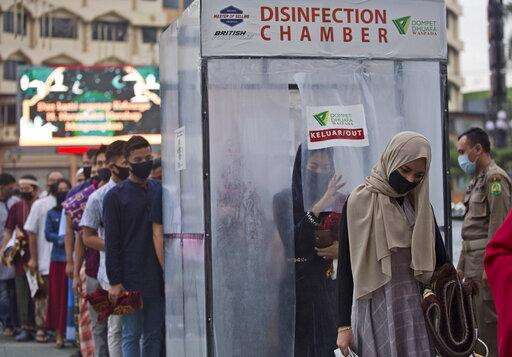
Muslims queue up to enter a disinfection chamber set up as a precaution against the new coronavirus outbreak, prior to entering Al Mashun Grand Mosque's compound to attend an Eid al-Adha prayer in Medan, North Sumatra, Indonesia, Friday, July 31, 2020. Eid al-Adha, or "Feast of the Sacrifice," is a holiday which honors the prophet Ibrahim, or Abraham, as he is known in the Bible, for his willingness to sacrifice his son on the order of God who was testing his faith. (AP Photo/Binsar Bakkara)
The Associated Press
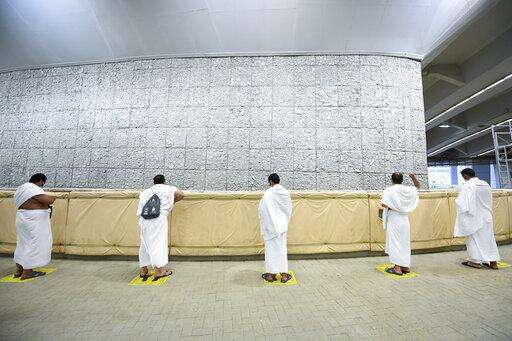
Muslim pilgrims cast stones at a pillar in the symbolic stoning of the devil, the last rite of the annual hajj, and the first day of Eid al-Adha, in Mina near the holy city of Mecca, Saudi Arabia, Friday, July 31, 2020. The global coronavirus pandemic has cast a shadow over every aspect of this year's pilgrimage, which last year drew 2.5 million Muslims from across the world to Mount Arafat, where the Prophet Muhammad delivered his final sermon nearly 1,400 years ago. Only a very limited number of pilgrims were allowed to take part in the hajj amid numerous restrictions to limit the potential spread of the coronavirus. (Saudi Ministry of Media via AP)
The Associated Press
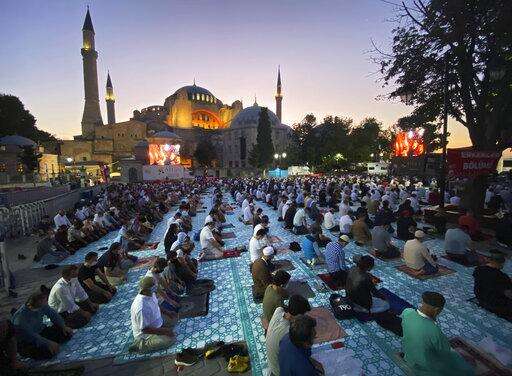
Muslims, wearing protective masks as a precaution against the coronavirus, offer their prayers during the Eid al-Adha prayer backdropped by the Byzantine-era Hagia Sophia, recently converted back to a mosque, in the historic Sultanahmet district of Istanbul, early Friday, July 31, 2020. Eid al-Adha, also known as the Festival of Sacrifice, at the end of the hajj pilgrimage to Mecca, is amajor holiday observed by billions of Muslims across the globe.This is the first Feast of Sacrifice since the onset of the global coronavirus pandemic. (AP Photo/Mehmet Guzel)
The Associated Press
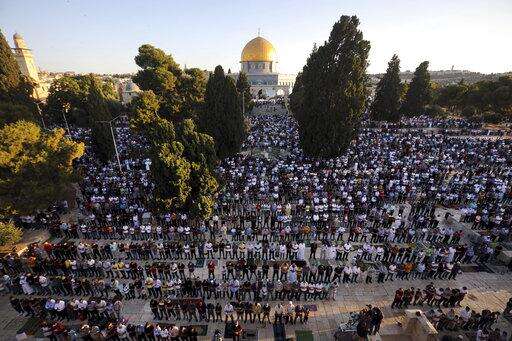
Muslim men offer Eid al-Adha prayer next to the Dome of the Rock Mosque in the Al Aqsa Mosque compound in Jerusalem's old city, Friday, July 31, 2020. This is the first Feast of Sacrifice since the onset of the global coronavirus pandemic. The major Muslim holiday, at the end of the hajj pilgrimage to Mecca, is observed around the world by believers and commemorates prophet Abraham's pledge to sacrifice his son as an act of obedience to God. (AP Photo/Mahmoud Illean)
The Associated Press
Health officials spray disinfectant inside the Namira Mosque in Arafat during the annual hajj pilgrimage near the holy city of Mecca, Saudi Arabia, Thursday, July 30, 2020. This year's hajj was dramatically scaled down from 2.5 million pilgrims to as few as 1,000 due to the coronavirus pandemic. (Saudi Ministry of Media via AP)
The Associated Press
A man wearing a face mask has his temperature checked to try stop the spread of coronavirus, before being allowed to go into Manchester Central Mosque, in Manchester, northern England, as Muslims worldwide mark the start of the Eid al-Adha holiday, Friday, July 31, 2020. The British government on Thursday night announced new rules on gatherings in some parts of Northern England, including Manchester, that people there should not mix with other households in private homes or gardens in response to an increase trend in the number of cases of coronavirus cases per 100,000 people. (AP Photo/Jon Super)
The Associated Press
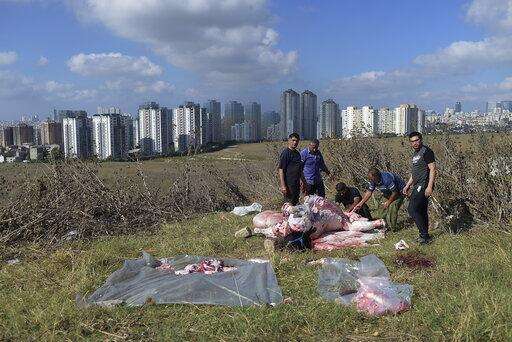
People cut meat at an open air market for animals at the start of Eid al-Adha, in Istanbul, Friday, July 31, 2020. Small groups of pilgrims performed one of the final rites of the Islamic hajj on Friday as Muslims worldwide marked the start of the Eid al-Adha holiday amid a global pandemic that has impacted nearly every aspect of this year's pilgrimage and celebrations. The last days of hajj coincide with the four-day Eid al-Adha, or "Feast of Sacrifice," in which Muslims slaughter livestock and distribute the meat to the poor. (AP Photo/Yasin Akgul)
The Associated Press
Muslim youths pray on a pedestrian bridge outside a crowded mosque during an Eid al-Adha prayer in Medan, North Sumatra, Indonesia, Friday, July 31, 2020. Eid al-Adha, or "Feast of the Sacrifice," is a holiday which honors the prophet Ibrahim, or Abraham, as he is known in the Bible, for his willingness to sacrifice his son on the order of God who was testing his faith. (AP Photo/Binsar Bakkara)
The Associated Press
Worshippers wearing masks to help stop the spread of the coronavirus, offer Eid al-Adha prayer while maintaining a social distance in front of the Gazi Husrev-beg mosque in Sarajevo, Bosnia, Friday, July 31, 2020. Eid al-Adha, or Feast of Sacrifice, Islam's most important holiday, marks the willingness of the Prophet Ibrahim to sacrifice his son. (AP Photo/Kemal Softic)
The Associated Press
Mullahs wearing masks to help stop the spread of the coronavirus, attend an Eid al-Adha prayer while maintaining a social distance at an almost empty main mosque in Moscow, Russia, Friday, July 31, 2020. Eid al-Adha, or Feast of Sacrifice, Islam's most important holiday marks the willingness of the Prophet Ibrahim to sacrifice his son. (AP Photo/Alexander Zemlianichenko)
The Associated Press
Worshippers wearing masks to help stop the spread of the coronavirus, offer Eid al-Adha prayer in front of the Gazi Husrev-beg mosque in Sarajevo, Bosnia, Friday, July 31, 2020. Eid al-Adha, or Feast of Sacrifice, Islam's most important holiday, marks the willingness of the Prophet Ibrahim to sacrifice his son. (AP Photo/Kemal Softic)
The Associated Press
Afghan Muslims greet each other after offering Eid al-Adha prayers in Kabul, Afghanistan, Friday, July 31, 2020. During the Eid al-Adha, or Feast of Sacrifice, Muslims slaughter sheep or cattle and distribute portions of the meat to the poor. (AP Photo/Rahmat Gul)
The Associated Press
Kosovo police officers stand outside the Sultan Mehmet Fatih mosque in Pristina, Kosovo, Friday, July 31, 2020. Government measures banned all public gatherings including religious due to fear of recent uprise in COVID-19 cases. (AP Photo/Visar Kryeziu)
The Associated Press
Mullahs wearing masks to help stop the spread of the coronavirus wait for Eid al-Adha prayer while maintaining a social distance at the almost empty main Mosque in Moscow, Russia, Friday, July 31, 2020. Eid al-Adha, or Feast of Sacrifice, Islam's most important holiday, marks the willingness of the Prophet Ibrahim to sacrifice his son. (AP Photo/Alexander Zemlianichenko)
The Associated Press
Muslim worshippers wearing masks to help stop the spread of the coronavirus, offer Eid al-Adha prayer while maintaining a social distance at the Mohammad al-Amin Mosque in Beirut, Lebanon, Friday, July 31, 2020. Eid al-Adha, or Feast of Sacrifice, Islam's most important holiday marks the willingness of the Prophet Ibrahim to sacrifice his son.(AP Photo/Hassan Ammar)
The Associated Press
Muslim worshippers wearing masks to help stop the spread of the coronavirus, attend to offer Eid al-Adha prayer while maintaining a social distance at the Mohammad al-Amin Mosque in Beirut, Lebanon, Friday, July 31, 2020. Eid al-Adha, or Feast of Sacrifice, Islam's most important holiday marks the willingness of the Prophet Ibrahim to sacrifice his son. (AP Photo/Hassan Ammar)
The Associated Press
Muslim worshippers wearing masks to help stop the spread of the coronavirus, offer Eid al-Adha prayer while maintaining a social distance at the Mohammad al-Amin Mosque in Beirut, Lebanon, Friday, July 31, 2020. Eid al-Adha, or Feast of Sacrifice, Islam's most important holiday marks the willingness of the Prophet Ibrahim to sacrifice his son. (AP Photo/Hassan Ammar)
The Associated Press
Palestinians Muslims offer Eid al-Adha prayers, in the West Bank city of Nablus, Friday, July 31, 2020. Eid al-Adha, or Feast of Sacrifice, Islam's most important holiday marks the willingness of the Prophet Ibrahim to sacrifice his son. (AP Photo/Majdi Mohammed)
The Associated Press
A few hours before prayers for the Islamic festival of Eid al-Adha, a municipality worker wearing protective clothing against the spread of coronavirus sprays disinfectant in the Byzantine-era Hagia Sophia, recently converted back to a mosque, in the historic Sultanahmet district of Istanbul, early Friday, July 31, 2020. This is the first Feast of Sacrifice since the onset of the coronavirus pandemic. The major Muslim holiday, at the end of the hajj pilgrimage to Mecca, is observed around the world by believers and commemorates prophet Abraham's pledge to sacrifice his son as an act of obedience to God. (AP Photo/Yasin Akgul)
The Associated Press